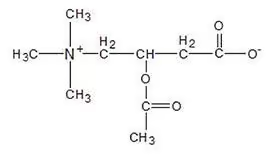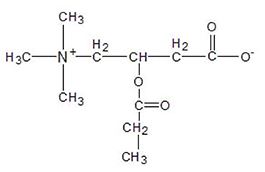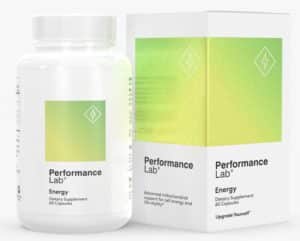Table of Contents
Key Takeaways
- Acetyl-L-Carnitine (ALCAR) is a synthesized version of L-Carnitine that enhances energy production, supports fat burning, and improves cognitive function.
- ALCAR facilitates fatty acid transport to mitochondria, boosts acetylcholine formation, and exhibits antioxidant properties.
- ALCAR benefits brain health by supporting mitochondrial function, protecting brain cells, and improving cerebral blood circulation.
- It has potential therapeutic effects on conditions such as Alzheimer’s, dementia, Parkinson’s, depression, and mild cognitive impairment.
- ALCAR supplementation dosage recommendation is 500 – 1,500 mg per day depending on the desired goal. If you’re in a hurry, you can get an effective dose of ALCAR in this supplement: Click for Performance Lab® Energy
Acetyl-L-Carnitine (ALCAR, ALC or LAC) is a synthesized version of L-Carnitine. Which is a derivative of the amino acids lysine and methionine.
ALCAR is more bioavailable than L-Carnitine. It easily crosses the blood-brain barrier. And delivers L-Carnitine across cell membranes and into your brain (which L-Carnitine would not be able to cross on its own).
L-Carnitine is naturally made in your liver and kidneys. And then transported to other tissues including your brain and heart.
ALCAR helps:
- Brain Energy Metabolism. ALCAR helps facilitate fatty acid transport to the mitochondria where they’re needed for producing adenosine triphosphate (ATP). Fatty acid metabolism fuels your cells and can boost physical and mental energy. This also assists with fat burning in other cells.
- Neurotransmitters. ALCAR is a necessary ingredient for acetylcholine formation. Which boosts memory, mental alertness, and fluid thought.
- Brain Optimization. The antioxidant properties of Acetyl-L-Carnitine provides neuroprotective qualities, boosts Brain-Derived Neurotrophic Factor (BDNF), and promotes cerebral blood circulation.
Acetyl-L-Carnitine (ALCAR) Overview
L-Carnitine is an amino acid that’s synthesized in your body. You also get it from red meat and dairy.
 L-Carnitine is considered a “conditionally essential” nutrient because when your body uses it faster than it can produce it, you need supplemental L-Carnitine either from food or a supplement.
L-Carnitine is considered a “conditionally essential” nutrient because when your body uses it faster than it can produce it, you need supplemental L-Carnitine either from food or a supplement.
L-Carnitine is used throughout your body. Here we’re talking about the Acetyl-L-Carnitine form of L-Carnitine because of its affects on brain health and chemistry.
L-Carnitine vs. Acetyl-L-Carnitine: What’s the Difference?
L-Carnitine and Acetyl-L-Carnitine are often referred to as Carnitine. But each are structurally different, and each has its advantages.
L-Carnitine: Helps produce energy within the mitochondria of your cells, but is not capable of crossing the blood-brain barrier. Supplemental L-Carnitine is difficult for your body to absorb; only 18% of it reaches your bloodstream.
L Carnitine supplements are favored by athletes and dieters who want Carnitine’s fat-metabolizing benefits. But are not seeking any brain benefits.

Acetyl-L-Carnitine: Is easier to absorb and used by your body than L-Carnitine. In one animal study, who were given 2 grams of ALCAR daily for 50 days, ALCAR boosted blood levels of ALCAR by 43%.[i]

ALCAR does everything that L-Carnitine does, but by adding an acetyl group, it but can also cross the blood-brain barrier. In another animal study, researchers found that ALCAR supports mitochondrial function which then protects brain cells from oxidative stress, while L-Carnitine does not.[ii]
How does Acetyl-L-Carnitine Work in the Brain?
Acetyl-L-Carnitine boosts brain health and function in several ways. But two in particular stand out.
- ALCAR boosts acetylcholine, a neurotransmitter tied to memory and overall brain function. Acetyl-L-Carnitine is a precursor to acetylcholine in the presence of Coenzyme-A. Test tube studies shows that ALCAR donates a “acetyl group” to help make acetylcholine.[iii]
Alzheimer’s-diseased brains show a 25% to 40% reduction in carnitine acetyltransferase, an enzyme that works with L-Carnitine & Acetyl-L-Carnitine.
This enzyme decline led researchers to link low ALCAR with low acetylcholine, and Alzheimer’s onset. They went on to suggest that the therapeutic properties of ALCAR supplementation is a viable therapy for brain regeneration.[iv]
- ALCAR promotes brain energy metabolism by supporting your brain cell’s mitochondria in creating ATP which is your main source of cellular energy.[v]
ALCAR works as a shuttle transport for fatty acids through cell membranes into mitochondria to assist with adenosine triphosphate (ATP) synthesis.[vi]
ALCAR is essential for fatty acid oxidation:
- ALCAR shuttles fatty acids into mitochondria, for the creation of ATP.
- ALCAR then shuttles fatty acids out of mitochondria, and flushes out tox ic byproducts.

ALCAR helps maintain mitochondrial function in nearly every cell of your body. Your brain consumes at least 20% of your body’s energy. And generates a lot of toxic byproducts as well as different chronic intermittent stressors. . So ALCAR supplementation is particularly important for a healthy brain.
How things go bad
As we get older, our brain chemistry and energy metabolism changes.[vii]
↓ Nerve growth factor in the brain declines
↓ Acetyl-L-Carnitine levels decline
↓ Acetylcholine levels decline
↓ Mitochondria loses efficiency
All of these age-related changes are contributing factors to cognitive impairment and the neurodegenerative diseases of aging, including Alzheimer’s and dementia.
ALCAR Nootropic benefits
Animal research conducted at the Linus Pauling Institute at Oregon State University shows that Acetyl-L-Carnitine will:[viii]
- Restore efficient mitochondrial energy production
- Replenish age-related changes to mitochondrial structure
- Replenish ALCAR and acetylcholine levels in the brain and body
One of the most potent Acetyl-L-Carnitine benefits is that it has the ability to boost acetylcholine and rejuvenate brain cells (including mitochondria). This has been proven to benefit those with age-related brain diseases like Alzheimer’s and major depressive symptoms.[ix]
And one animal study conducted in New Delhi showed that Acetyl L-Carnitine reduces lipofuscin in the cerebral cortex, hippocampus, striatum and thalamus.
How does Acetyl-L-Carnitine feel?
You may not feel ALCAR… unless you’re elderly, have low energy levels, or have Erectile Dysfunction. Within those specific groups, users of Acetyl-L-Carnitine report it helps with memory, mental fatigue, mood, mental performance and the ability to get and maintain an erection.
 ALCAR’s brain support and its ability to support the mitochondria in your brain cells should boost cognition in all age and gender groups.
ALCAR’s brain support and its ability to support the mitochondria in your brain cells should boost cognition in all age and gender groups.
As a nootropic, ALCAR user reviews report a boost in energy and quicker thinking.
ALCAR Clinical Research
In one study, researchers showed that ALCAR may have beneficial effects for depression and dementia in the aging brain.[x]
Another study out of Italy; researchers showed that Acetyl-L-Carnitine stimulated the growth of new neurites. More of these minute projections from nerve cell bodies meant increased signaling between cells throughout the central nervous system (brain and spinal cord).[xi]
And a study conducted at the Mount Sinai School of Medicine in New York found that ALCAR has potential in treating the symptoms of Parkinson’s Disease. By directly affecting mitochondrial respiration and assisting dopamine receptors and the use of dopamine in the brain.
ALCAR helps with Mild Cognitive Impairment (MCI)
A gold-standard double-blind, randomized controlled trial on 1,204 people showed significant effect on attention, mental performance, memory and higher mental functions.[xii]
In this study ALCAR seemed to ward off further brain deterioration. And could be considered as therapy for brain degeneration.
Acetyl-L-Carnitine slows rate of cognitive decline
130 Alzheimer’s patients were given ALCAR or a placebo daily for a year. They were tested across 14 points of cognitive performance.
This research showed a slower decline in cognitive performance with the ALCAR group compared to the placebo group.[xiii]
ALCAR effective for Chronic Fatigue Syndrome
 Acetyl-L-Carnitine has been shown to improve fatigue in patients with chronic fatigue syndrome.
Acetyl-L-Carnitine has been shown to improve fatigue in patients with chronic fatigue syndrome.
In a randomized, double-blind, crossover study; 36 people were treated for 3 months with either amantadine (used to treat Chronic Fatigue), or 1 gram of ALCAR twice daily.
The results of the study showed that ALCAR was better tolerated and more effective for brain function than the pharmaceutical for fatigue.[xiv]
Acetyl-L-Carnitine protects from oxidative damage of Ecstasy (MDMA)
Research has shown ALCAR to be effective in protecting your mitochondria from oxidative stress. But these guys took it a step further.
Male rats were given Acetyl-L-Carnitine before a dose of Ecstasy (MDMA). ALCAR pretreatment “exerts effective neuroprotection against MDMA-induced neurotoxicity at the mitochondrial level”, said the researchers.[xv]
Keep that in mind before your next party.
ALCAR for Erectile Dysfunction?
Carnitine versus androgen administration. In this study, 120 patients were split into 3 groups. Group 1 was given 160 mg

of testosterone per day. The 2nd group was given 2 grams of Propionyl-L-Carnitine plus 2 grams of Acetyl L Carnitine hcl per day. And the 3rd group a placebo.
Did you know that there’s an International Index of Erectile Function?
Turns out the Propionyl-L-Carnitine/Acetyl-L-Carnitine stack was better than testosterone for sexual dysfunction. Without the side effects of an enlarged prostate, better orgasms, more sexual desire and improved mood.[xvi]
ALCAR Recommended Dosage
- Acetyl-L-Carnitine suggested dosage for cognitive benefits is 1 – 4 grams per day.
- For improved mood and elimination of chronic fatigue, 1 – 3 grams of ALCAR per day.
- For age-related memory concerns, 1 – 2 grams of ALCAR per day.
ALCAR is water-soluble and can be taken on an empty stomach with water. A few supplement manufacturers recommend taking their Acetyl-L-Carnitine with a meal. Which may imply that it’s fat-soluble although I’ve found no evidence in the scientific literature.
ALCAR Side Effects
Acetyl-L-Carnitine is produced naturally in your body. So is considered well-tolerated and safe.
Side effects are rare but can include nausea, vomiting, increased agitation, weight loss, and restlessness.
You can also see an increase in seizure frequency if you have any kind of seizure disorder.
ALCAR and thyroid hormones. L-carnitine inhibits both triiodothyronine (T3) and thyroxine (T4) entry into the cell. Which means ALCAR supplementation may make thyroid hormone replacement therapy less effective. But could also help someone suffering from hyperthyroidism.
Types of ALCAR to buy
- Acetyl-L-Carnitine: L-Carnitine with an extra acetyl group. This version of l carnitine is more bioavailable and easily crosses the blood-brain barrier.
- L-Carnitine: This is the standard form of l carnitine found in food.
- Lipo-Carn®: A proprietary blend of Alpha-Lipoic Acid and Acetyl-L-Carnitine. Studies show this combination is a powerful anti-aging duo.

Performance Lab Energy contains an effective dose of ALCAR Together, these two help combat diabetes, glucose metabolism, boost energy production, lower high blood pressure, fat metabolism, maintain proper cognitive function, protects the body from radiation and chemical toxins and helps immunity.[xvii]
- Propionyl-L-Carnitine: L-Carnitine combined with propionic acid. This form is noted for its antioxidant activity, reducing oxidative stress biomarkers, and is used for heart health applications. Also useful for erectile dysfunction.
- Biosint™ is pharmaceutical grade Acetyl-L-Carnitine that is manufactured in Italy by Sigma Tau HealthSciences
You can also get 500 mg Acetyl L-Carnitine, 100 mg BioEnhanced™ R-Lipoic Acid, 100 mg CoQ10, 10 mg BioPQQ®, and 2.5 mg BioPerine® in one dose of my favorite energy supplement Click for Performance Lab® Energy .
Nootropics Expert Recommendation
Acetyl-L-Carnitine 500 – 1,500 mg per day
 I recommend using Acetyl-L-Carnitine as a nootropic supplement.
I recommend using Acetyl-L-Carnitine as a nootropic supplement.
Your body does synthesize some ALCAR on its own. And from the food you eat. But most L-Carnitine comes from red meat. And unless you eat a lot of great quality grass-fed beef or mutton you can not produce sufficient amounts, and likely have an Acetyl-L-Carnitine deficiency.
ALCAR is especially helpful for those suffering from age-related cognitive decline. Studies show it helps stop or reverse brain degeneration with Alzheimer’s Disease, and geriatric depression. Particularly in the early stages of the disease.
I suggest starting with a dose of 500 mg ALCAR daily. ALCAR is a great compliment to a stack including any of the racetams. Take enough Alpha GPC or CDP-Choline to eliminate a racetam-induced headache. Then add 500 mg of ALCAR.
Some have found ALCAR stacked with Coenzyme Q-10 has a profound effect on everything from mood to bipolar disorder. Especially combined with Alpha-Lipoic Acid.|
You can also get 500 mg Acetyl L-Carnitine, 100 mg BioEnhanced™ R-Lipoic Acid, 100 mg CoQ10, 10 mg BioPQQ®, and 2.5 mg BioPerine® in one dose of my favorite energy supplement Click for Performance Lab® Energy .
Age-related cognitive disorders like Alzheimer’s may want to up the dose to 1,500 mg per day.







Join The Discussion - 372 comments
John
January 18, 2019
My brain fog vanish if i take at least 1000 mg ALCAR at morning. The problem is that i get insomnia if i take more than 250 mg ALCAR. Do you have any idea why ALCAR causes insomnia for me?
David Tomen
January 18, 2019
John, ALCAR is a great energy booster. And it sounds like it is working well for you. I suggest you start using some nootropics to slow your brain down at the end of the day. Here are some suggestions that work well for me and many others > https://nootropicsexpert.com/best-nootropics-for-sleep/
David
January 14, 2019
I have been trying to find out if taking apple cider vinegar (acetic acid) with L-carnitine, would be the same as taking ALCAR – comments?
David Tomen
January 14, 2019
David, I don’t believe so because acetic acid is produced by acetic acid bacteria during fermentation. Acetyl-L-Carnitine is where an acetyl group displaces the hydrogen atom in the central hydroxyl group of carnitine (https://www.ncbi.nlm.nih.gov/pubmed/17331998). This is a natural occurrence within cells.
Gabriella
October 8, 2018
Hi David,
I’m interested in stacking my ALCAR with CoQ10. What amounts would you suggest of both? Specifically for mood due to Bipolar?
Thanks!
David Tomen
October 8, 2018
Gabriella, ALCAR is dosed at 1 – 3 grams per day. Higher doses are split into 2 or 3 smaller doses to make up the total.
CoQ10 is dosed 100 – 400 mg per day depending on what your body needs.
For both of these start at the lower dosage and see how your body and brain react. Then slowly increase to the highest recommended dose as needed until you feel better.
Steve
September 19, 2018
Hi David
Could you clarify a couple of points please? In your article you say ALCAR is water soluble and there is no scientific evidence it is fat soluble. The in your response to a comment you say it is fat soluble and you take it with oil.
I have taken it on an empty stomach with liquid for a year and benefitted from mental alertness and probably lost a little body fat. However I read long term use can make some people need a couple of naps a day. I was finding a power nap helpful in the afternoon so wondered if ALCAR was making me feel like this?
David Tomen
September 20, 2018
Steve, I’m not sure what I was thinking when I made that comment a year ago. I just re-read the study linked to in that comment and the researcher clearly states in his very last line, “Carnitine supplements are therefore likely to be much better absorbed on an empty stomach!) https://www.ncbi.nlm.nih.gov/pmc/articles/PMC2278553/. So I needed to go back and edit that year-old comment. Thank you.
I doubt it’s ALCAR that’s leading to feeling like you need to take a nap. Because one study found ALCAR useful for treating Chronic Fatigue Syndrome. And the guys at Performance Lab use ALCAR as the first ingredient in their Energy formula: https://nootropicsexpert.com/performance-lab-energy-review/
Vishal
September 5, 2018
Hi David,
I’ve just started taking a combination ALCAR and ALA (Alpha-Lipoic acid) product that’s specifically designed for sexual health. I’ve taken a whole bunch of supplements before to repair damage done to my erectile function and mental health (stimulants, antidepressants, recreational stuff).
It’s just been 6 days, but I have to say I don’t feel any marked effects or improvement so far. In fact, I feel slightly less satisfaction.
Is there an adjustment process that I need to ride out? How long is it, and when I can start to reap the benefits of this stack?
Thanks
David Tomen
September 6, 2018
Vishal, I’m know much more about the human brain than I know about sexual health. But, I am male so first thing is you don’t mention the dosage of ALCAR and Alpha Lipoic Acid your are using. And I’ve personally found that 6,000 mg of L-Arginine with 1,000 mg of L-Citrulline does wonders for an erection.
Jason
May 17, 2020
Skip the l-arginine and go with just l-carnitine, 3,000 to 6,000 mg. Citrulline is FAR more effective at increasing plasma arginine levels than l-arginine AND isn’t associated with gastro distress. It takes an hour after ingestion for citrulline / arginine levels to reach peak levels.
Sarah Cloud
August 31, 2018
Which is better? NALT or ALCAR? Would rather only order one so trying to figure out which is more beneficial.
David Tomen
August 31, 2018
Sarah, neither is ‘better’ because N-Acetyl L-Tyrosine and Acetyl-L-Carnitine are two completely different nootropics with different mechanisms of action and different benefits.
Please read both reviews again and do a ‘cost benefit’ to determine which may work best for you.
Masa
July 6, 2018
Hey David,
I was wondering if ALCAR is an appropriate supplement for those who suffer from hypothyroidism as there is a good amount of research papers suggesting it is an antagonist especially to T3?
Thank you!
David Tomen
July 6, 2018
Masa, glad you brought this up. The studies you are referring to about carnitine and “hyperthyroid” are old studies. But are still relevant. However, the most recent research shows ALCAR beneficial for reducing fatigue in “hypothyroid” patients: https://www.ncbi.nlm.nih.gov/pubmed/27432821
I’ve been using ALCAR for about 10 years and am hypothyroid using NP Thyroid (similar to Armor). And have not had any problem. But I also use NALT which stimulates the synthesis of T4 & T3. So is it counteracting inhibition by ALCAR? I don’t honestly know. Just that it works in real life.
ALCAR is critical for a host of health issues and especially for something dealing with thyroid issues. The best way to know is use ALCAR and then get a thyroid panel done.
And to be on the safe side, don’t dose ALCAR at the same time as your thyroid meds. Leave a 1 – 2 hour window between ALCAR and thyroid medication.
Edgar
June 29, 2018
Been taking ALCAR for a week, about 250mg a day along with ‘Animal Flex’ which contains the following:
3000mg total:
Glucosamine (As HCL, Sulfate 2KCI)
Methylsulfonymethane (MSM)
Chondroitin Sulfate A (CSA)
Chondroitin Sulfate C (CSC)
1000mg total:
Flaxseed Oil (50% Alpha Linolenic Acid)
Cetyl Myristoleate Proprietary Blend
(Cetyl Myristoleaste**, Cetyl Myristate, Cetyl Palmitate, Cetyl Laurate, Cetyl Palmitoleate, Cetyl Oleate)
Hyaluronic Acid
1000mg total:
Ginger Root Extract (Gingerols, Shogaols)
Turmeric Root (Curcumin)
Boswellia (Resin) (Boswellic Acid)
Quercetin
Bromelain
I almost always have blood pressure of 120~/80~, after taking the above for the first 4-5 days I started noticing that my blood pressure is at at 75~/50~ for the past 3 days, I test it 4-5 times a day and it’s always this low, I’ll decrease the amount of both by x2 and see if it improves. I guess one of them has something in it that enhances the effect of lowering blood pressure.
David Tomen
June 29, 2018
Edgar, It could be the Turmeric that is causing the drop in blood pressure. But it’s just a guess. Do some research on Quercetin and Bromelain and see if they have any effect as well. I’m not familiar enough with any of the others near the top of your list. But something in there could be the culprit too.